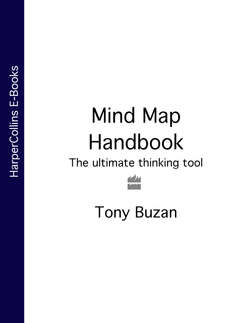Читать книгу Mind Map Handbook: The ultimate thinking tool - Тони Бьюзен, Tony Buzan - Страница 14
2.3 Word Power I – Roots: How to Improve Your Vocabulary, Creativity, Memory and IQ!
Оглавление‘Words are the instruments that make thought possible.’
Judd
‘Words are the body of thought.’
Carlyle
In this chapter and the next you are going to learn more about the incredible power of words.
I will guide you through recent history, showing you how words developed as a ‘secret power’, and will introduce you to research that show why this was so.
The bulk of this chapter and the next are then devoted to a veritable feast of building blocks of vocabulary and Verbal Intelligence: Roots, Prefixes and Suffixes.
With the mastery of these your Verbal Intelligence will inevitably improve, and your life will change irrevocably!
Words and Power
Since the dawn of civilization, words have had an aura of mystery, magic and power to them. The earliest form of writing (Cuneiform) developed in the Near East, in Mesopotamia, to allow rulers to keep accurate records of what taxes were due and who had paid them, and for other bureaucratic records, such as details of amounts of grain stored and distributed.
In ancient Egypt the priests were the ‘keepers of the word’. They tried to keep the art of writing and reading secret, because doing so gave them tremendous power to manipulate both knowledge and people. For the next four thousand years leaders in all societies kept this special power to themselves, communicating in the secret codes of higher vocabulary and writing, while the ignorant masses around reacted with awe, superstition and fear at the power that words held over them.
‘We rule men with words.’
Napoleon
This power was the power over knowledge; the power of persuasion; the power to inspire; the power to mesmerize; and the power to control and lead. In other words, it was the power to affect the human brain.
Two of our modern words, which you would never have thought would have derived from this history, do – ‘spell’ and ‘glamour’!
As recently as the great European Renaissance, the time of Queen Elizabeth I and the master-works of Shakespeare, still surprisingly few people could read or write. The record books show that most of the young people who had to sign for a marriage licence did so not with their name, but with a cross.
The ability to read and write was looked upon by the ordinary people with awe, and those who were able to do so were often considered to be dabbling in some form of magic. Those who could write could, in general, spell.
So the logic in the ignorant and fearful mind was that those who could spell possessed a magic that could mysteriously and ominously control others. As a word could be considered a ‘spell’ the owner of such esoteric knowledge, by using words, was ‘casting spells’: QED!
The word ‘glamour’ has a similarly interesting etymology, or derivation. In the 17th century the language of the intellectuals was predominantly Latin. In this they used to write, converse and increase their grip on social, economic and political power.
To ‘tie their words together’ they used the mystical concept of ‘grammar’. Grammar became an idea that linked with those who had authority and power. As time passed the first ‘R’ in grammar slowly mutated, as ‘R’s often do over time, to the letter ‘L’. Thus ‘grammar’ eventually became ‘glamour’, a word that is still applied to those who emanate an aura of power, elegance and control.
Words still hold a spell over us, and rightly so. As you continue to improve your Verbal Intelligence, you will increasingly become a Word Magician.
Word Roots
One of the best ways to become an adept verbal magician is to study the Roots of the words we commonly use.
When you study word Roots, not only do you instantly increase the power of your vocabulary and Verbal Intelligence, you come to realize an important fact: words are not cold, abstract, dead things. They are warm, emotional, meaningful and very much alive.
Like all living things words are conceived, born and grow to maturity. Eventually they pass on their meaning and energy to new word forms and languages.
The study of Roots is the study of fascinating stories about the creation and birth of words. You are now involved in this wonderful study, and therefore can be called an ‘etymologist’. The word ‘etymology’, can be traced back to the Greek ‘etymon’ (meaning ‘true or original meaning’) and also to the Greek ‘–logia’, ‘study of’, which, in turn, comes from the Greek ‘logos’, meaning ‘word’!
So you can now truthfully say that you are an etymologist: one who is interested in and studies the science of true or original meanings.
Each Root is like a little being in suspended animation. By studying it you bring it to life, allowing the beautiful imagery, history and poetry that is the word’s essence to live again. For example, if you listen to classical music you will often hear that a piece is entitled ‘Opus 1’ or ‘Opus 104’. People often think that this means something like ‘creative inspiration’ or ‘musical masterpiece’, but what does it actually mean?
